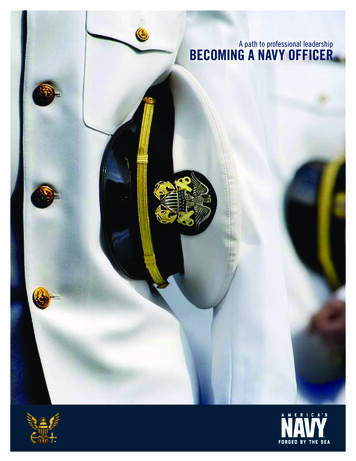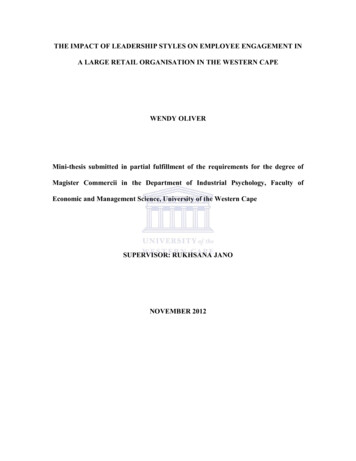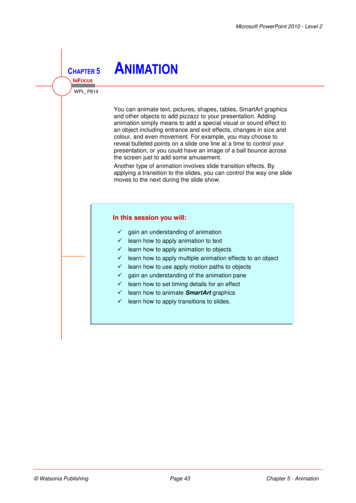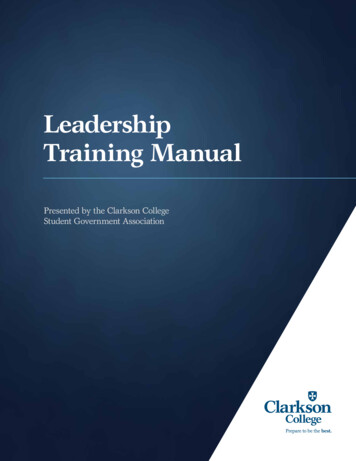
Transcription
A path to professional leadershipBECOMING A NAVY OFFICER
Officer typesAmerica’s Navy employs the most highly qualified andtalented men and women in the country. Each is a trueprofessional in every sense of the word, holding to thehighest standards in their everyday lives.In order to know what it means to be a Navy Officer, it helps to understand the various typesof Navy Officers.Unrestricted Line OfficerThese Officers are not restricted in the performance of duty and are eligible to command ships,submarines, aircraft squadrons, fleets and shore bases. Jobs in this category include SurfaceWarfare Officers, Pilots, Navy Flight Officers, Aviation Support Officers, Submarine Officers andOfficers in Naval Special Warfare/Naval Special Operations. They are commissioned throughOfficer Candidate School, the Naval Reserve Officers Training Corps or the Naval Academy.Restricted Line OfficerThese Officers are designated for duties in aviation, engineering, aerospace engineeringor special duty. Jobs include Aviation Maintenance Officers, Specialists in CryptographicSupport, Intelligence, Automatic Data Processing, Public Affairs and Oceanography. They arecommissioned through Officer Candidate School, Direct Commission Officer School, the NavalReserve Officers Training Corps or the Naval Academy.Staff Corps OfficerThese are specialists in career fields that are professions unto themselves, such as physicians,nurses, chaplains, lawyers, civil engineers, etc. They are commissioned through OfficerDevelopment School, Direct Commission Officer School or the Naval Reserve OfficersTraining Corps.Ready to take the next steps?Once you’re inspired, better informed and seriously interested,here’s how to proceed:1. Talk to your recruiter Find a local recruiter at navy.com/locatorAsk questionsDiscuss your long-term goalsReview your qualifications Go over relevant financial incentives and bonuses2. Apply for the position Go to navy.com/apply, follow the link at the bottomand complete the online application Provide personal information that includes your birthcertificate, social security card and professionaldetails (if applicable) Pass a full medical examination Participate in a precommitment interview3. begin your Training G et commissioned as an Officer by completing the Officertraining program associated with your career track From there, you’re ready to start serving as anOfficer and respected leaderNotesLimited-Duty OfficerThese are former Enlisted Sailors who are commissioned based on extensive training andexperience in their jobs. They are limited to performing their duties within their specific field.COM2
OFFICER TRAINING AND DEVELOPMENTWhile there are those who are born leaders, they still must acquire the skills andknowledge it takes to lead. At Officer Candidate School (OCS), Officer Development School(ODS) and Direct Commission Officer (DCO) School – as well as through the Naval ReserveOfficers Training Corps (NROTC) or the Naval Academy – exceptional men and women honetheir leadership skills to form a strong foundation for a successful career as a Navy Officer.NotesOfficer candidate schoolThe 12-week OCS course at Naval Station Newport in Rhode Island is designed to giveyou a working knowledge of the Navy (afloat and ashore), to prepare you to assume theresponsibilities of a Naval Officer, and to begin developing you to your fullest potential.The training is extremely demanding, both mentally and physically. Upon successfulcompletion of OCS, you will be commissioned as a Navy Officer.During your training period, you will be instructed on leadership, receive physical andmilitary training, and study academics related to the command of ships and submarines.AcademicsDuring your time at OCS, you’ll receive instruction in: Naval Leadership Naval Administration Naval Organization Sea Power Military Law Military IndoctrinationNaval WarfareDamage ControlSeamanshipDivision OfficerSpecial Emphasis ProgramYou will also receive leadership training through the Division Officer Leadership Course,which is held during the last two weeks of the course.Physical TrainingOn your fourth week of training you will be required to pass a second Physical FitnessAssessment (PFA) with a score of Satisfactory-Medium.Physical training will entail running four days a week and strength and conditioning exercisestwo days a week. Your run distance will be 1.5 miles for the first four weeks, and then will jumpto three miles for the final eight weeks. All running is on paved roads.Please Note: It pays to be in peak physical condition when reporting for OCS.COM3
OFFICER TRAINING AND DEVELOPMENTOfficer development schoolNotesOfficer Development School (ODS) is a five-week program located at Naval Station Newport inRhode Island. ODS trains already-commissioned Officers who are pursuing careers in a specificfield of study such as nuclear engineering, chaplaincy, oceanography or health care.ODS offers newly commissioned Officers a comprehensive and intense introduction to theirresponsibilities as Navy Staff Corps Officers. Here, they learn about the military structureof the U.S. Navy, its rich history of traditions and customs, leadership development, andmilitary etiquette.In short, it covers all you need to know to begin an Officer career filled with endlessopportunities. Generous benefits. And the chance to make a difference in the world.AcademicsDuring your five weeks at ODS, you’ll receive instruction in: Naval Warfare Naval Leadership Damage Control Naval Administration Seamanship Naval Organization Division Officer Sea Power Special Emphasis Program Military Law Military IndoctrinationYou will also receive leadership training through the Division Officer Leadership Course,which is held during the last two weeks of the course.Physical TrainingWhile at ODS, you will complete three Physical Readiness Tests (PRTs) – In PRT, Mid PRTand Out PRT.Physical training will include two to three days of strength and conditioning exercises,which include push-ups, sit-ups and various other exercises.You will run three to four days a week. For the first two weeks, you will run approximately1.5 miles each run day. During weeks three through five, you will run approximately three mileseach run day. All running is on paved roads.Please Note: It pays to be in peak physical condition when reporting for ODS.COM4
OFFICER TRAINING AND DEVELOPMENTNotesDirect commission officer schoolWhereas OCS and ODS are programs preparing Officers for full-time leadership roles on ActiveDuty, Direct Commission Officer (DCO) School – which is also located at Naval Station Newportin Rhode Island – is a 12-day course for newly appointed Officers in the Navy Reserve.This intensive course prepares degreed and often highly experienced professionals to assumeNavy Reserve Duty leadership positions in any of a broad range of critical career focus areas –including everything from law and intelligence to engineering and chaplaincy to public affairsand health care.Here, you’ll learn the basic history, traditions and structure of the Navy and Navy Reserve. You’llreceive leadership training that will introduce you to the role of an Officer. And you’ll quickly beprepared to apply leadership skills and professional expertise in your respective field.AcademicsDuring your time at DCO school, you’ll receive 90 hours of instruction in: Naval LeadershipNaval AdministrationNaval OrganizationSea PowerMilitary LawMilitary Indoctrination Naval WarfareDamage ControlSeamanshipDivision OfficerSpecial Emphasis ProgramPhysical TrainingWhile at DCO school, you will complete physical conditioning and be required to pass a ThirdClass Swim Test.Please Note: It pays to be in peak physical condition when reporting for DCO school.COM5
OFFICER TRAINING AND DEVELOPMENTNotesNaval reserve officers training corpsThe Naval Reserve Officers Training Corps (NROTC) aims to develop college students morally,mentally, and physically, and to instill in them the highest ideals of honor, courage andcommitment. The program educates and trains young men and women for leadership positionsin an increasingly technical Navy and Marine Corps.The NROTC Program is available at more than 160 colleges and universities. Selectedapplicants are awarded scholarships through a highly competitive national selection process,and receive full tuition and other financial benefits at many of the country’s leading collegesand universities.AcademicsIn addition to a normal course load, NROTC students also receive instruction in: Introduction to Naval ScienceSea Power and Maritime AffairsLeadership and ManagementNavigationNaval Ship Systems I (Engineering)Evolution of WarfareNaval Ship Systems II (Weapons Systems) Naval Operations and SeamanshipLeadership and EthicsEvolution of Amphibious WarfareSenior Naval Science SeminarSpecial Emphasis ProgramPhysical TrainingThroughout their college experience, NROTC students participate in regular physicaltraining exercises.Naval AcademyThe United States Naval Academy (USNA) is another way to become an Officer in the Navy.For details about this path, visit usna.edu.COM6
receive leadership training that will introduce you to the role of an Officer. And you'll quickly be prepared to apply leadership skills and professional expertise in your respective field. Academics During your time at DCO school, you'll receive 90 hours of instruction in: Naval Leadership Naval Administration Naval Organization










